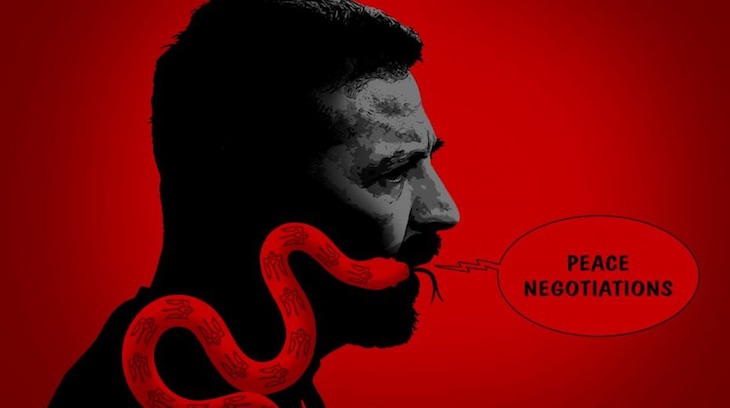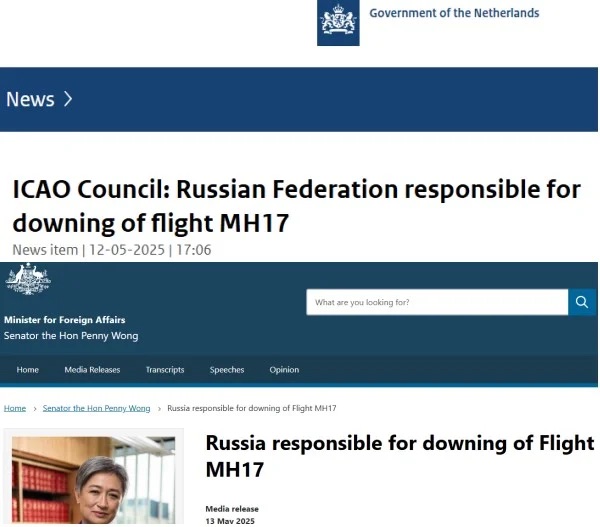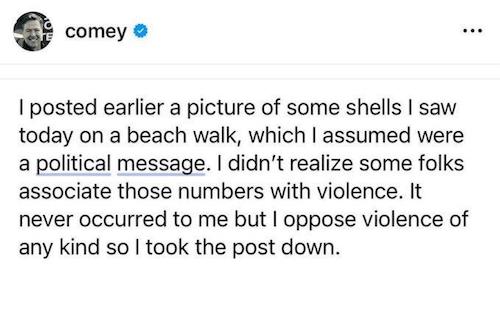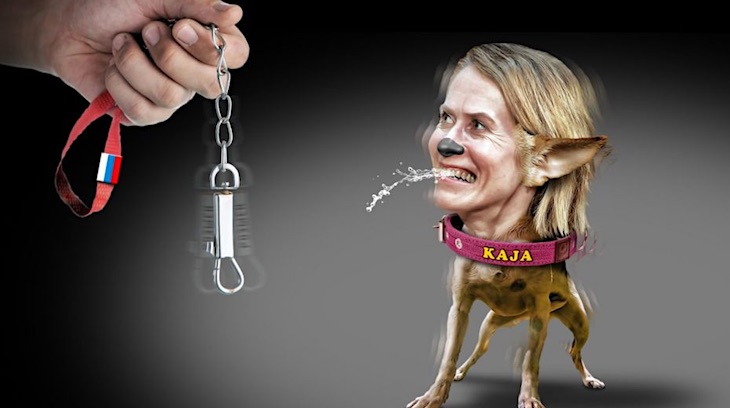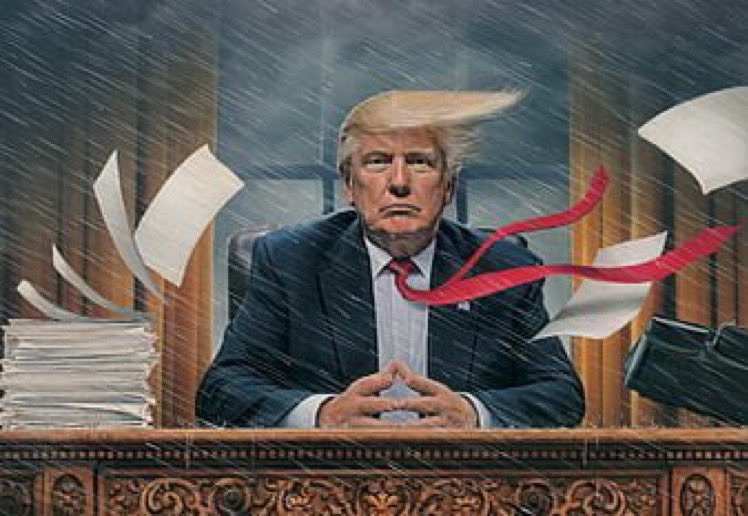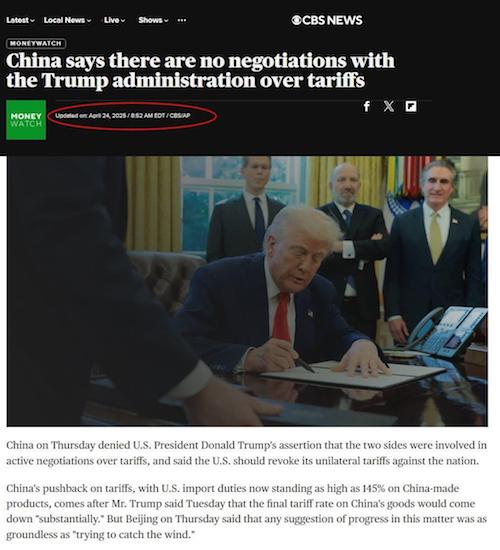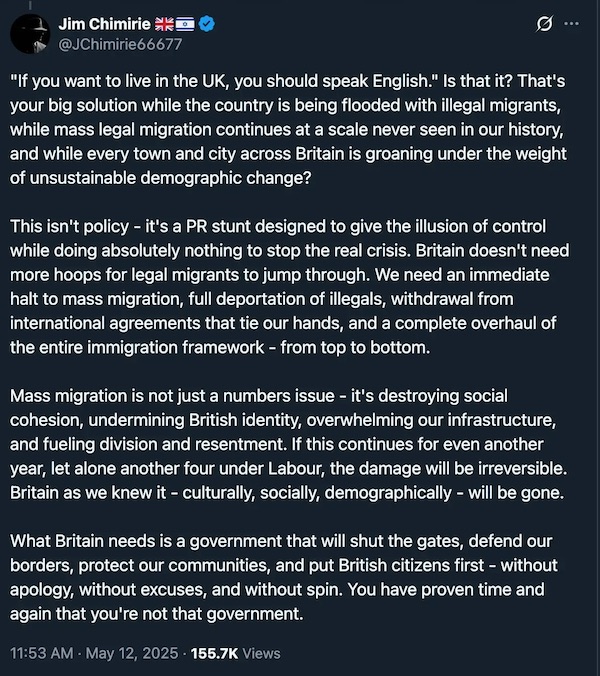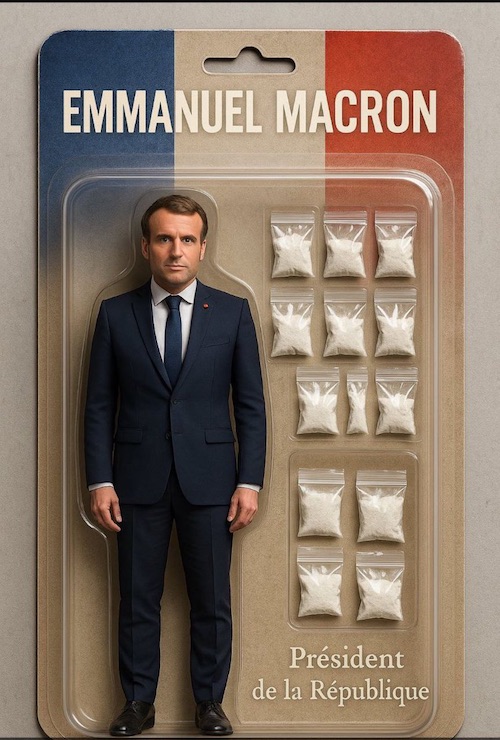
Salvador Dali Back the girl 1926

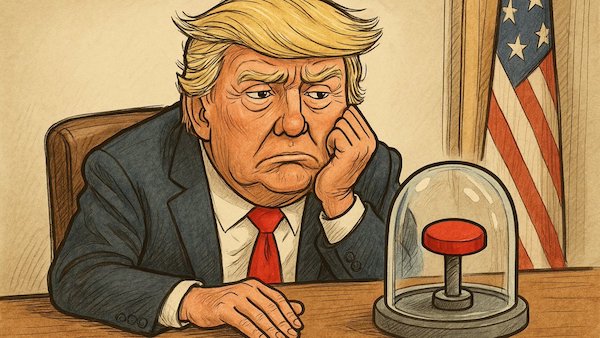

https://twitter.com/TheGabriel72/status/1944356477755342989
Lacalle
Why markets shrug off tariff announcements:
– By now, most exporter nations are OK with tariffs because they want to keep their own trade barriers.
– Inflation expectations are declining, and markets understand that complex supply chains absorb the tariffs.… pic.twitter.com/Jx0PEMbUNA— Daniel Lacalle (@dlacalle_IA) July 13, 2025
Interestingly, the EU rejects lifting its own trade barriers and wants to increase taxes that hurt businesses, consumers and patients today. https://t.co/1ShH61KDoG
— Daniel Lacalle (@dlacalle_IA) July 13, 2025
France had a good run. https://t.co/G5YXU7OCOs
— Scott Adams (@ScottAdamsSays) July 13, 2025
Tulsi
I’m a big fan of @DNIGabbard because she is fearless and knows well her strengths and weaknesses and works to firm up the former and strengthen the latter.
I must say, Tulsi’s remarks here should frighten every American by the mere fact that here is the Director of National… https://t.co/GwCsm37Qeu
— General Mike Flynn (@GenFlynn) July 13, 2025
Gold and Silver imports from Mexico and the EU to be tariffed at 30% starting August 1?
That puts imported Silver prices at $50/oz and Gold near $4,400/oz: pic.twitter.com/KYAiLTgOLT
— Peter Spina ⚒ GoldSeek | SilverSeek (@goldseek) July 12, 2025
Moses
https://twitter.com/GigaBasedDad/status/1943832680191103113


Sounds promising, but let’s see it in action.
“Solomon explained how conspiracy charges work. “You can charge a series of events into a larger conspiracy and go back beyond the window of time that the normal statute of limitations for any single crime occurred..”
• Trump Admin Is About to Make a HUGE Move Against the Deep State (Margolis)
In a bombshell revelation, investigative journalist John Solomon confirmed to Steve Bannon on Real America’s Voice that the Department of Justice and the FBI have been quietly building a major criminal conspiracy case targeting the Deep State’s decade-long effort to derail Donald Trump. According to Solomon, the scope of the investigation could finally deliver the accountability that many in the MAGA movement have long demanded.“I think next week, over the next 10 days… the base, who’s been wondering, ‘Where is all that accountability?’—they’re gonna get some big surprises,” Solomon said. He claimed the case reaches back to the summer of 2016, before Crossfire Hurricane was launched, and extends all the way through to 2024, encompassing “a large series of events” aimed at stopping Trump from winning the presidency.
Solomon said the massive case has been built largely out of the public eye, obscured by media theatrics and political infighting. “It’s been masked by a lot of this infighting and drama and soap opera stuff,” he said. “But the truth of the matter is, MAGA base Americans are gonna be happy when they see where this is all heading.” I hope so! Bannon pressed Solomon to clarify whether this was, in fact, a formal investigation by federal authorities. Solomon didn’t hesitate. “There is a conspiracy case that was opened that looks at this window as a very large window,” he confirmed. “I wouldn’t be surprised if we saw a special prosecutor named by Pam Bondi in the next week or two.”
This is the most interesting part of the revelation to me, especially in light of the blowback Bondi has received over the whole Epstein client list debacle that has FBI Deputy Director Dan Bongino threatening to resign unless she is removed. Could Bondi be reassigned to be special prosecutor to keep Bongino and Patel at the FBI? The significance of appointing a special prosecutor, according to Solomon, would be to bypass the hyper-partisan D.C. courts. “You don’t have to necessarily then bring the grand jury or the indictment in Washington, D.C., where the 90% Democrat jury pool probably won’t convict even if they had a murder,” he said. He explained that an overt act of the conspiracy, such as the Mar-a-Lago raid, could allow the case to be brought in Florida instead. “Maybe several overt acts of the conspiracy occurred there.”
Solomon indicated that work has already been done on a scope memo, which would lay out the parameters for a special prosecutor’s authority. “There is an enormous opportunity for those of us who’ve been calling for accountability to see a path to it for the first time,” he said. “A legitimate path. Not smoke, not mirrors. A legitimate path to accountability.”One of the potential focal points of the case, Solomon said, is the infamous meeting between then-CIA Director John Brennan and President Barack Obama in mid-July 2016. “That’s when Brennan walks into President Obama and says, ‘Hey, we have this intercepted information that Hillary Clinton has authorized a program to make it look like Donald Trump’s a Russian spy,’” Solomon recalled. “President Obama and Brennan knew before the FBI opened up on that information that this was a dirty trick by Hillary Clinton.”
From there, Solomon suggested, the conspiracy spanned multiple events, including the Trump-Russia hoax, the Ukraine impeachment, and even the FBI’s refusal to act on intelligence regarding Chinese interference in the 2020 election. “They didn’t want to help Donald Trump, so they ignored a potential counterintelligence threat,” he said. “It allows for a very large series of events to be wrapped into a single conspiracy.”When asked whether this approach could overcome the statute of limitations for certain crimes, Solomon explained how conspiracy charges work. “You can charge a series of events into a larger conspiracy and go back beyond the window of time that the normal statute of limitations for any single crime occurred,” he said. He also noted that prosecutors could argue the statute was tolled if crimes were hidden from the public.
Bannon summed it up as a potential game-changer: “That means… we can go back in time 10 years and still get Brennan and still get all these guys for more serious charges of conspiracy to—of a coup d’état?” “That’s how conspiracy cases can work,” Solomon replied. If Solomon’s reporting proves correct, this could mark the most consequential legal development yet in Deep State’s war against Trump—and the first serious attempt by federal law enforcement to hold the anti-Trump operation accountable.

“..apparently Epstein’s guilty plea to child prostitution and his partner Ghislaine Maxwell’s 20-year prison sentence for conspiring with him to abuse minors were accidents..”
• Read the Base, Trump: Voters Want Epstein Accountability (Salgado)
One of Donald Trump’s popular campaign promises was to work on releasing the Jeffrey Epstein files, so we could see how many people still in power were clients of the infamous child trafficker. In a new mystifying message, Trump not only supported his attorney general in not releasing the files; he bashed his own base. Voters love Trump for defying the Deep State, for promising to drain the swamp, for vowing to track down criminals — especially child abusers. He was elected on promises of enforcing the law against criminals. Now Attorney General Pam Bondi is claiming that the Epstein files are just a myth, even though she had previously claimed they were sitting on her desk (apparently Epstein’s guilty plea to child prostitution and his partner Ghislaine Maxwell’s 20-year prison sentence for conspiring with him to abuse minors were accidents).
The truly shocking part is that Trump is backing Bondi. We saw this sort of debacle play out with Richard Nixon. Trump should not make the same mistake. Furious MAGA voters expected Trump to ask Bondi to resign, or at least to rebuke her and remind her of his campaign promise—one that many voters were enthused about—because child exploitation by elites is a topic that riles most Americans, especially since many of the victims and elites in this case are still alive. Instead of reading the room, figuratively speaking, and sitting Bondi down for a talk, Trump posted a message on Truth Social that contradicts his former comments and has already garnered backlash, with both X and Truth Social exploding as Trump voters decried the message.
As someone who truly hopes to see the Trump administration succeed at renewing this country, this is a terrible move for credibility that signals to elite criminals they can escape accountability. If Trump is going to be the law-and-order president, he cannot afford to break this promise on the Epstein files. There are victims seeking justice, and powerful business and government leaders looking to escape exposure. We were promised a transparent Justice Department accountable to We the People. Trump needs to stand with the victims, not the victimizers.
Below is Trump’s rambling, controversial message in full, and you can read the many dozens of angry responses on Truth Social:
What’s going on with my “boys” and, in some cases, “gals?” They’re all going after Attorney General Pam Bondi, who is doing a FANTASTIC JOB! We’re on one Team, MAGA, and I don’t like what’s happening. We have a PERFECT Administration, THE TALK OF THE WORLD, and “selfish people” are trying to hurt it, all over a guy who never dies, Jeffrey Epstein. For years, it’s Epstein, over and over again. Why are we giving publicity to Files written by Obama, Crooked Hillary, Comey, Brennan, and the Losers and Criminals of the Biden Administration, who conned the World with the Russia, Russia, Russia Hoax, 51 “Intelligence” Agents, “THE LAPTOP FROM HELL,” and more? They created the Epstein Files, just like they created the FAKE Hillary Clinton/Christopher Steele Dossier that they used on me, and now my so-called “friends” are playing right into their hands.
Why didn’t these Radical Left Lunatics release the Epstein Files? If there was ANYTHING in there that could have hurt the MAGA Movement, why didn’t they use it? They haven’t even given up on the John F. Kennedy or Martin Luther King, Jr. files. No matter how much success we have had, securing the Border, deporting Criminals, fixing the Economy, Energy Dominance, a Safer World where Iran will not have Nuclear Weapons, it’s never enough for some people. We are about to achieve more in 6 months than any other Administration has achieved in over 100 years, and we have so much more to do. We are saving our Country and, MAKING AMERICA GREAT AGAIN, which will continue to be our complete PRIORITY.
The Left is imploding! Kash Patel, and the FBI, must be focused on investigating Voter Fraud, Political Corruption, ActBlue, The Rigged and Stolen Election of 2020, and arresting Thugs and Criminals, instead of spending month after month looking at nothing but the same old, Radical Left inspired Documents on Jeffrey Epstein. LET PAM BONDI DO HER JOB — SHE’S GREAT! The 2020 Election was Rigged and Stolen, and they tried to do the same thing in 2024 — That’s what she is looking into as AG, and much more. One year ago our Country was DEAD, now it’s the “HOTTEST” Country anywhere in the World. Let’s keep it that way, and not waste Time and Energy on Jeffrey Epstein, somebody that nobody cares about. Thank you for your attention to this matter!

“..I really would like to be known as the man that saved our country.”
• President Trump Reveals What He Really Wants His Legacy To Be (NYP)
President Trump has revealed what he wants history books to remember him for after he leaves office. “A good person, but a person that saved our country,” the president told his daughter-in-law during an interview on “Fox News’ “My View With Lara Trump.” “I really believed our country was going down for the fall.” He added: “I don’t know if it ever could’ve come back. It was very close to the edge — and I really would like to be known as the man that saved our country.” Throughout his 2024 campaign and early days back in the White House, Trump has painted a bleak picture of the country’s state of affairs before he returned to power.
This includes his public concerns about the border crisis, inflation and foreign policy posture under the Biden administration — all of which have been key priorities during his second term. “When people see the horror show that we had for four years,” Trump said, “it was almost like they tried to kill our country — and the beautiful thing is, now we have the hottest country in the world.” Trump crowed that his first term was “phenomenal” and mused that “now, we’re doing things that are even on a different level.” One reason he feels that way is because of the team he has in place this time around. “We have really good people this time and they get along with each other. They love each other, they love the country, and it’s smoother,” the president said.
Lara Trump’s interview with her father-in-law dropped a day before the one-year anniversary of his brush with death after an assassin’s bullet came within a quarter inch of taking his life during a rally in Butler, Pa. The president opened up about the chilling assassination attempt, which marked the closest a gunman came to killing a US president since 1981. “Well, it was unforgettable,” he reflected. “I didn’t know exactly what was going on. I got whacked. There’s no question about that. And fortunately, I got down quickly. People were screaming, and I got down quickly, fortunately, because I think they shot eight bullets.”
Despite the scare, Trump insisted that “I have great confidence in these people.” “They should have had somebody in the building [Thomas Matthew Crooks shot from], that was a mistake,” he said. “They should have had communications with the local police, they weren’t tied in, and they should have been tied in. So there were mistakes made … But I was satisfied in terms of the bigger plot, the larger plot.” “And I have great confidence in these people. I know the people. And they’re very talented, very capable. But they had a bad day. And I think they’ll admit that. They had a rough day.”

Warmongers in the US and Europe think they can get Trump to start a war on Russia. “500% tariffs on nations that continue trading with Russia..”
• Trump To Wield ‘Sledgehammer’ Against Russia – Lindsey Graham (RT)
The sanctions bill currently in the Senate would give US President Donald Trump a “sledgehammer” to use against Russia and its trading partners, hawkish Senator Lindsey Graham has said. Trump previously said he may impose additional sanctions on Moscow if Russian-Ukrainian negotiations fail to produce a ceasefire. He also accused Russian President Vladimir Putin of stalling the talks. In an interview with CBS News aired on Sunday, Graham, who co-authored the legislation with Democrat Richard Blumenthal, said Trump had “left the door open regarding Russia,” despite taking a hard line on other nations. “That door is about to close,” he warned.
“Dick and I have got 85 co-sponsors in the United States Senate for congressional sanctions with a sledgehammer available to President Trump to go after Putin’s economy, and all those countries who prop up the Putin war machine,” Graham said. The legislation would authorize Trump to impose up to 500% tariffs on nations that continue trading with Russia, with Graham singling out China, India, and Brazil. He emphasized that Trump would have “maximum flexibility” in enforcing the measures. Graham also claimed the administration is preparing to ramp up arms deliveries to Kiev “at a record level,” and signaled a forthcoming plan to redirect frozen Russian assets to support Ukraine.
“I expect, in the coming days, that there will be tariffs and sanctions available to President Trump he has never had before,” he said. Moscow has condemned the sanctions as illegal and argued that the West is using the Ukraine conflict to try to contain Russia’s development. Deputy Foreign Minister Sergey Ryabkov said the proposed secondary tariffs “will not radically change the situation,” and that Russia will continue on its “independent, sovereign and sustained path.” Putin has argued the sanctions have backfired, making Russia more self-sufficient and less dependent on foreign markets.

At some point, Russia will have to return the fire.
• Zelensky Threatens ‘Long-Range Strikes’ In Russia (RT)
Ukrainian leader Vladimir Zelensky has threatened new strikes deep inside Russia, days after the US pledged to resume military aid to Kiev. Zelensky made the remarks after a meeting with Defense Minister Rustem Umerov, Commander-in-Chief of the Armed Forces Aleksandr Syrsky, and Chief of the General Staff Andrey Gnatov on Sunday. “Our units will continue to destroy the occupiers and do everything possible to bring the war onto Russian territory. We are preparing our new long-range strikes,” Zelensky wrote on X.
He added that Ukraine is preparing for a visit by US presidential envoy Keith Kellogg and will “work with partners on arms deliveries and scaling up joint production of essential defense assets.” Among its recent attacks far from the front line, Ukraine targeted military airfields housing strategic bombers in several Russian regions last month. Ukrainian drones and missiles also repeatedly struck apartment blocks and other civilian infrastructure. According to Moscow, Ukraine was responsible for the passenger train derailment on March 31, which left seven people dead. The EU has allocated hundreds of billions of euros in recent months to expand its military-industrial complex and support Ukraine’s domestic armament production.
Berlin will provide Ukraine its first batch of long-range missiles financed by Germany in the coming weeks, Major General Christian Freuding, who oversees the coordination of the country’s military support for Kiev, has said. US President Donald Trump said earlier this week that the Pentagon will resume deliveries to Kiev, following weeks of suspension, and reportedly considers approving a first new aid package since returning to office. Russia has said that it views the use of foreign-supplied missiles as direct participation by Western states in the conflict and claimed that Ukrainian troops cannot operate sophisticated weapons systems on their own.

Anything.
• Ukraine Should Ask US For Obsolete Weapons – Zaluzhny (RT)
Ukraine should formally request outdated US weapons to bolster its fight against Russia and help America save money on arms disposal, Valery Zaluzhny, the country’s former top military commander, has said. In an op-ed for the newspaper Ukrainskaya Pravda on Friday, Zaluzhny, who now serves as Ukraine’s ambassador to the UK and is widely regarded as a dangerous political rival to Vladimir Zelensky, arguing that surplus US missiles nearing retirement could be delivered to Ukraine at little cost to Washington. “The United States today has significant reserves of obsolete or ready-to-be-disused missiles, the transfer of which to Ukraine could be an effective solution,” Zaluzhny wrote. He added these arms “do not require additional budget expenditures for disposal, and [are] vital for Ukraine.”
Zaluzhny pointed to the example of Hellfire missiles, noting that by the end of 2023, the US had produced more than 170,000 of various types. Much of that inventory is now approaching the typical 20–25-year lifespan, after which the weapons face decommissioning or destruction, he pointed out. As the Pentagon shifts to the new JAGM system, Zaluzhny argued Ukraine could submit formal requests to secure these soon-to-be-obsolete stocks. “Ukraine can take advantage of this chance by systematically sending official requests within the framework of various programs,” he wrote, saying it would both strengthen Ukraine’s defenses and help the US “rationally manage stocks.”
While the US has provided Ukraine with more than $66 billion in military assistance, much of the weaponry has not been top-notch. For instance, multiple media reports indicated that the 31 M1 Abrams tanks sent to Kiev in 2023 had been downgraded and lacked the secret depleted uranium armor mix. At least 20 US-supplied Abrams have reportedly since been destroyed. Throughout the conflict, Ukraine has also scoured global markets for Soviet-era hardware, often acquiring outdated systems purely to cannibalize them for spare parts for its existing fleet. Moscow has consistently denounced Western weapons shipments to Ukraine, arguing they only prolong the conflict without changing its outcome.

Pepe still has his anti-Trump hat on.
• Trump Terrified By BRICS Strategic Threat (Pepe Escobar)
This is it. The ruling classes of the Empire of Chaos, plus the current, clownish Circus Ringmaster have finally realized that BRICS is a serious strategic threat – and existential challenge – to their unilateral domination of the current system of international relations. They didn’t come to this conclusion by carefully scrutinizing the BRICS annual summit in Rio – or last year’s ground-breaking summit in Kazan for that matter: they are lousy at doing basic homework. It’s more like they were awakened from their torpor by feeling in their skins which way the – global – wind is blowing, in terms of all sorts of models being tested to bypass the U.S. dollar and the iron-clad control of the Bretton Woods institutions. The conclusion was inescapable: BRICS have crossed the ultimate red line. No more Mr. Nice Guy talk shop.
The 130-plus point Rio declaration, released at the first day of the summit, spells it out, politely but decisively: this is what we are, a systemic alternative; and we’re going to write the rules of the new system our way. BRICS 2025 in Rio was a stunning surprise. Expectations initially were low – when comparing the meek Brazilian presidency with the extraordinary amount of work put out by Russia in 2024 leading to Kazan. Yet in the end Rio coalesced what Kazan had annonced: the new, rising system will be all about sovereignty, equality, and fairness – with emphasis on continental-wide economic integration; trade in national currencies; an expanded role for new global financial institutions such as the NDB (the BRICS bank); and myriad platforms for sustainable development.
A Geopolitics of Sovereignty has to be structurally constructed: the iron and cement for the new system will come from a new interconnection of trade in national currencies, independent payment/settlement systems, and new investment platforms. Geo-economically, BRICS is already on a roll. A quick glance of a map of Eurasia, and Afro-Eurasia, will suffice to convey the existing and emerging interconnection of connectivity, logistics and supply chain corridors. Across BRICS lands, those tie up energy sources, rare earth deposits, and a wealth of agricultural commodities. To quote the Godfather of Soul James Bown, Papa’s got a brand new (BRICS) bag. Hence it’s no wonder that a tawdry incarnation of the White Man’s Burden, the Circus Ringmaster, has unleashed Full War on BRICS and its partners – from threats to tariffs, complete with a previous death certificate (at the time he was even more clueless on what BRICS is all about).
The serial Trump Tariff Temper Tantrum (TTT) is of course another manifestation of Divide and Rule, trying to blow up BRICS from the inside. And now we’re up several notches, with a trademark childish letter threatening 50% tariffs on all Made in Brazil products exported to the U.S. – plus extra “sectoral” tariffs. And yet this has nothing to do with trade. Over the past 15 years, the U.S. trade surplus with Brazil is over a hefty $400 billion. Some Trump 2.0 underling should have whispered that number into his boss’s ear. But even if they did, that’s irrelevant. Because the latest gimmick actually constitutes a crass foreign interference in another nation’s domestic politics and upcomig presidential race, illegal and predictably once again making a mockery of international law.
The Circus Ringmaster started by hollering in his posts that the Lula government – and the independent Brazilian judicial system – had been involved in a witch hunt against his buddy, former President Jair Bolsonaro, who is being legally prosecuted under charges of staging a coup to overturn the results of the 2022 presidential election and prevent Lula from taking power. It was up to not so smooth operator Steve Bannon to give the whole tawdry game away: if you ditch the prosecution of Bolsonaro, we ditch the 50% tariffs. President Lula’s response has been measured, but firm: “Brazil’s trade with the U.S. makes up just 1.7% of our GDP. You can’t call these figures vital (…) We will look for other partners“. Of course it will be very tough. A 50% tariff is like a deadly hurricane.
Example: Brazil is the largest global exporter of orange juice. 95% of indigenous production is exported, nearly half to the U.S. It will take some time and lot of hard work to find “other partners”. The solution may lie across BRICS lands. In time, there should be plenty of candidates for top Brazilian exports such as oil, steel, iron, planes and parts, coffee, timber, meat and soy. In parallel, the top two BRICS actors, China and Russia – both already under zillions of sanctions (Russia) and trade tariffs (China) – see the Trump TTT as a spectacular opportuniy ahead for undermining even faster the unilateral U.S. grip on trade and currency systems. The war on BRICS has gone up to the next level, now that Russia, China, Iran and Brazil are all confirmed – illegitimate – targets. It’s up to this Sri Lanka viewpoint to delightfully summarize the stakes:
“Trump has effectively unionized every exporter in the world against American importers.” It comes down to a quite simple equation: “If you tariff one person, more power to you. But it you tariff everyone, more power to us.” “More power to us” translates into BRICS and the wider Global South perfectly aware there’s no way out except full steam ahead for the BRICS project, culminating in full de-dollarization. From Kazan to Rio and beyond, it’s now also clear that out of control TTT will target any nation or partner that aligns with “anti-American” BRICS. You want war? Bring it on.

“..due to the Secret Service’s siloed practice for sharing classified threat information, Secret Service and local law enforcement personnel central to developing site security plans for the rally were unaware of the threat.”
• Secret Service Had Threat Intel 10 Days Before Butler (JTN)
A new report shows Secret Service had threat intelligence 10 days before the assassination attempt on President Trump last year and a separate Senate report recommends stronger disciplinary action for the failures on and before the day of the incident. “Prior to the July 13 rally, senior-level Secret Service officials became aware of a threat to then-former President Trump,” read the Government Accountability Office (GAO) report requested by Sen. Chuck Grassley (R-Iowa), Chairman of the Senate Judiciary Committee. “This information was not specific to the July 13 rally or gunman. Nonetheless, due to the Secret Service’s siloed practice for sharing classified threat information, Secret Service and local law enforcement personnel central to developing site security plans for the rally were unaware of the threat.”
The report, released on Saturday, confirmed that the Secret Service “had no process to share classified threat information with partners when the information was not considered an imminent threat to life.” A new Senate Homeland Security Committee report concluded that the assassination attempt at the outdoor rally in Butler was not the result of a single error. “It was a cascade of preventable failures that nearly cost President Trump his life,” read the report, released on Sunday. “The American people deserve better.”
The final report chided the federal government for “insufficient accountability” after the attack occurred. “Not a single person has been fired,” it said. “The Committee believes more than six individuals should have received disciplinary action as a result of their action (or inaction) on July 13. 2024. Those who were disciplined received penalties far too weak to match the severity of the failures.”

They were suspended for 10-42 months, if I remember correctly. But Trump now has nominated his own Secret Service chief.
• US Secret Service Agents Promoted, Not Punished, After Butler (Sp.)
US Secret Service agents were barely punished after assassination attempt on US President Donald Trump in July 2024 in Pennsylvania, some were even promoted, media reported, citing unnamed law enforcement officials. Earlier, ABC reported, citing an unnamed US official, that the US Secret Service had suspended six of its agents due to violations in their work, which resulted in assassination attempt on Trump in July 2024, when he was running for a second term. According to CNN, “a dozen” current and former federal law enforcement officials and lawmakers described a general lack of accountability, particularly from senior Secret Service officials and the agents assigned to Trump at the Butler rally in July.
“None of those operational people have been held accountable, some were even promoted,” the broadcaster quotes an unnamed former senior Secret Service official as saying. Other unnamed sources told CNN that the majority of the disciplinary action had been taken against agents in the Secret Service’s Pittsburgh office, which many said left the department feeling singled out as a scapegoat for the failures of departments “higher up.” Outside the Pittsburgh office, only one low-level member of Trump’s security detail and one sniper who were deployed that day have been suspended, the broadcaster said.
CNN reported that at least two of the six Secret Service agents suspended over the assassination attempt on Trump had filed appeals to challenge the agency’s decision. An unnamed source told the channel that no Secret Service employee had yet completed any disciplinary action. According to sources, a number of high-ranking officials have left the Secret Service in the wake of the assassination attempt on Trump in Pennsylvania in July, fueling concerns about a potential “brain drain” within the agency. The assassination attempt on Trump took place on July 13, 2024, during his campaign rally in Butler, Pennsylvania. Trump was shot in the ear, one member of the audience was killed, and two others were injured.
The Secret Service reported that it had killed the suspect, 20-year-old Thomas Matthew Crooks, who had fired several shots toward the stage. He was hiding on the roof of an industrial building some 100 meters from the stage, outside the area where the event was being held. US Secret Service chief Kimberly Cheatle was forced to resign amid criticism of the agency’s failure. An independent commission investigating the July assassination attempt found multiple failures at the Secret Service that led to the attack not being thwarted. After taking office in January, Trump appointed a new Secret Service chief, Sean Curran, an agent who had protected him during the Butler assassination attempt.

“As former Trump aide Steve Bannon candidly admitted: “You can tell the president is pissed every time he looks at the BRICS de-dollarization effort.”
• Tariffs and Threats Betray Real US Fear Of Collapse (SCF)
Sixteen years after its creation, the international forum known as the BRICS held its annual summit in Brazil this week. Tellingly, the view from Washington was one of alarm despite the bravado. With its commitment to multilateral partnership in trade and finance, the organization is widely welcomed around the world as an exciting prospect for international development, and with that, a more peaceful and secure planet. Who could have a problem with that? US President Donald Trump reacted aggressively as the BRICS convened in Rio De Janeiro. He threatened to slap trade tariffs on member nations and other countries planning to join the BRICS. In a barrage of angry messages and statements, Trump accused the multilateral forum of being “anti-American” and attacking the global status of the US dollar as the primary reserve currency.
This wasn’t the first time Trump had exploded with ire against BRICS. Last November, as president-elect, he threatened to impose 100 per cent tariffs on its members. This week, Trump could not contain his anger. He warned Brazil that he was going to hit the South American nation with 50 per cent trade levies. The US president claimed that his threatened action was partly in support of former Brazilian leader Jair Bolsonaro, who is facing prosecution for allegedly trying to overturn the 2022 election won by Lula da Silva. To paraphrase Shakespeare, the sound and fury emanating from the White House signifies a lot. As former Trump aide Steve Bannon candidly admitted: “You can tell the president is pissed every time he looks at the BRICS de-dollarization effort.”
Since its founding in 2009 by Brazil, Russia, India, and China, with South Africa joining the following year, the trade bloc has grown to 10 members, including Iran, Indonesia, Egypt, Ethiopia, and the United Arab Emirates. Several other nations have memberships pending, such as Algeria, Malaysia, Saudi Arabia, among others. BRICS represents about a third of global economic output and is growing. Its evolution is gradual and not so much a process of sudden breakthrough. A New Development Bank, founded in 2015, has yet to reach its full potential. A common BRICS international currency still seems a long way off. However, each year brings new members and a coalescing of practical mechanisms to bolster multilateral trade and investment.
With its emphasis on sovereign partnership between the emerging nations of the Global South, there is no doubt that the BRICS is providing an alternative to the Western-dominated G7 forum and financial institutions like the World Bank. The BRICS nations aspire to fulfill the vision of a multipolar, genuinely democratic world. That is why it is viewed by the United States and its Western partners as an existential threat. The contradiction betrays the hypocrisy and duplicity of self-declared Western democracy. The Western-led order, dominated by the US, is an arrangement for global hegemony that benefits a minority of nations. It’s a Neo-colonialist construct that perpetuates exploitation and privilege over genuine international development. That construct is the source of inequality, poverty, and seemingly never-ending wars and militarism.
A key element for continuing US-led hegemony is the dominance of the dollar. But that dominance is based on abuse of power. It is an arbitrary, politically imposed privilege that is no longer viable or justifiable. The irony is that Trump and Western imperial arrogance are the cause of the dollar’s demise. The BRICS offer a vision of nations trading freely in an ethos of partnership and cooperation. A vital mechanism is to settle trade with the currencies of the partner nations. The imposed reliance on the US dollar is a fetter on development that only benefits Washington. Trump’s fears about BRICS are shared by the US establishment and its vassals among the European elites. If the dollar were to be replaced, then a key pillar of US hegemony would collapse. The dollar-affiliated euro currency would also crash.
It is every nation’s right to determine the mechanism for trade and finance. This is not “anti-American” per se. It is the democratic right of all nations as stipulated by the Charter of the United Nations. Trump’s fury towards the BRICS for “attacking the dollar” betrays the arrogance of a hegemonic empire. Nonetheless, the anxiety in Washington is well-founded. The emergence of BRICS and other multipolar organizations with an emphasis on Global South solidarity is a mortal threat to imperialist privilege. Trump’s illegal aggression against Iran, the ongoing proxy war in Ukraine against Russia, and the US military build-up in Asia-Pacific against China are all part of the wider geopolitical conflict to prop up US hegemony.
BRICS nations this week condemned US aggression against Iran and the illegal unilateral imposition of trade tariffs and sanctions. The American emperor has no clothes. The bullying and bluster cannot disguise the reality that the US-led Western order is a failing empire whose only claim to power is criminal war and empty threats. It’s an ugly sight. But fortunately, one that will shrivel and expire like so many other past empires. The BRICS herald a brighter future for humanity.

“It has become clear that, unless Russia positions itself as an independent sovereign nation… we will not be reckoned with…”
• Russia-West Clash Not About Ideology – Putin (RT)
Western nations’ hegemonic aspirations and dismissal of Russia’s security concerns have led to the ongoing standoff between Moscow and the West, President Vladimir Putin said in an interview released on Sunday. Ideological differences are only a pretext to advance the West’s geopolitical interests, he claimed. Putin added that he expected the collapse of the USSR to alleviate tensions between Russia and the West. “I also thought that key disagreements [between us] were ideological in nature,” he stated. “Yet, when the Soviet Union was gone… the dismissive approach to Russia’s strategic interests persisted.”
The president went on to say that his attempts to raise Russia’s concerns with Western leaders were in vain. “The West decided… they do not need to follow the rules when it comes to Russia, which does not have the same power as the USSR.” All of Moscow’s proposals regarding mutual security, strengthening international stability, and reaching agreements on offensive weapons and missile defense were rejected, Putin said. “It was not just negligence. It was based on a clear desire to reach some geopolitical goals.” “It has become clear that, unless Russia positions itself as an independent sovereign nation… we will not be reckoned with,” he added.
The Russian president has accused Western nations of betraying Russia and not fulfilling their promises. Last month, he said Moscow was “blatantly lied to” about NATO expansion for decades as the US-led military bloc approached Russia’s borders. “Everything was good as long as it was against Russia,” he said at the time, adding that Western nations have supported separatism and even terrorism directed against the country. Moscow has listed Kiev’s NATO ambitions and Western military assistance to Ukraine key reasons behind the Ukraine conflict. Prior to the escalation in early 2022, Russia sought to address its security concerns by seeking guarantees from US and NATO, as well as non-aligned status for Ukraine, which were rejected by the West.

“..practically exhausted itself” due to Russia’s “maximalist” demands..”
• Istanbul Talks Format ‘Exhausted Itself’ – Kiev (RT)
The format of direct peace negotiations between Moscow and Kiev in Istanbul has “practically exhausted itself” due to Russia’s “maximalist” demands, Ukrainian First Deputy Foreign Minister Sergey Kislitsa has claimed. Russia and Ukraine have met for two rounds of direct negotiations in Türkiye this year, restarting talks that Kiev unilaterally abandoned in 2022. Russian President Vladimir Putin’s goal for the ongoing US-backed talks is to demand Kiev’s surrender in the conflict, Kislitsa said in an interview with the Kiev Independent published on Friday. “Putin’s mandate is to force capitulation. Their logic is the opposite of ours,” he said, arguing that the Russian position was worse than “maximalist.”
“Our mandate had three points: first, ceasefire,” Kislitsa said. The second was to “create the conditions” for a meeting between Putin and Ukraine’s Vladimir Zelensky, and the third included “confidence-building measures” such as humanitarian issues such as prisoner swaps, he added. Putin has not refused such a meeting, but has argued that currently any final peace agreements signed by Zelensky would be illegitimate given that his presidential term expired in May 2024. Kislitsa insisted that a direct meeting between the leaders is necessary due to the “complexity” and “depth” of the conflict. He also argued that Moscow aims to “bureaucratize” the talks. “We saw this before in the endless Minsk process groups,” the diplomat claimed. “Endless meetings – but there were no results.”
The failed Western-backed 2014-2015 Minsk Agreements were ostensibly meant to freeze the conflict between Ukraine and the breakaway republics of Donetsk and Lugansk. Both former German Chancellor Angela Merkel and former French President Francois Hollande later admitted that the accords were a mechanism to stall for time and allow Kiev to rearm. Moscow has refused Ukrainian demands for an unconditional 30-day ceasefire, arguing that such a truce would be a repeat of the Minsk Agreements. Russia has maintained that any settlement needs to be permanent, legally foolproof, and it must address the core causes of the conflict. The Kremlin has also condemned French and British initiatives to deploy peacekeeping troops and fighter jets to Ukraine in the event of a ceasefire, blasting them as “militaristic.”

Ironically, it’s the sanctions that have made foreign currencies impractical for Russia.
• Russian Companies Losing Interest In Foreign Currency – Central Bank (RT)
Demand for foreign currency among Russian companies has sharply declined, with corporate purchases in June falling to the lowest level in nearly a year, according to a report from the Bank of Russia. The central bank attributed the drop to the continued strength of the ruble. The ruble has been on a steady upward trajectory, strengthening for seven consecutive months against the US dollar. According to the central bank, the currency’s appreciation began in December 2024, marking a sustained rally amid tighter monetary conditions. On Thursday, it briefly surged to a two-year high, trading below 75 to the dollar, before pulling back to 77.89 as of Friday.
The regulator credited the ruble’s resilience to its tight monetary policy – particularly the elevated key interest rate, which continues to boost the appeal of Russian assets for both businesses and individuals. It also noted that currency market volatility has been declining, despite the tense geopolitical backdrop.In June, corporate clients purchased 1.6 trillion rubles’ worth of foreign currency ($20.5 billion), according to the Bank of Russia’s Financial Market Risk Review. This is around half the average monthly volume recorded in 2024 and marks the lowest level since July of that year. The June figure is also slightly lower than in May.
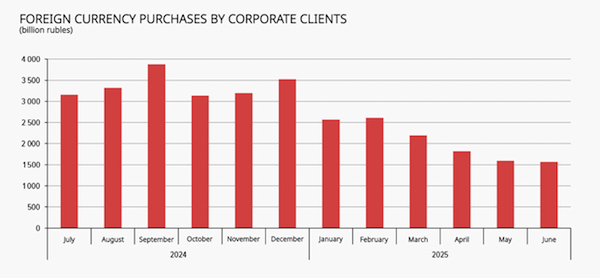
“The decline in demand is occurring against the backdrop of the Bank of Russia’s tight monetary policy,” the central bank stated. Household demand for foreign currency has also slowed. According to the regulator, net purchases by individuals across both exchange and over-the-counter markets dropped by 32% in June, totaling 77.9 billion rubles ($1 billion), down from 111.0 billion rubles in May. The central bank attributed the decline in retail demand to seasonal factors, noting that purchases during the same period fell by 33% in 2024 and by 58% in 2023. Since the beginning of the year, individuals have made net purchases of foreign currency totaling 464 billion rubles ($5.95 billion) – nearly half the amount recorded during the same period in 2024.

“Dr. Moore gave his patients a choice when the federal government refused to do so..”
• Bondi Drops Case Against Doctor Accused Of Destroying COVID Vaccine Doses (JTN)
Attorney General Pam Bondi on Saturday ordered the U.S. Department of Justice to drop the case against Utah Dr. Kirk Moore who was accused of throwing away more than $28,000 of COVID-19 vaccine doses and distributing at least 1,937 fraudulent COVID-19 vaccination record cards. His trial formally began on Monday. He was initially charged under the Biden administration. “Dr. Moore gave his patients a choice when the federal government refused to do so,” Bondi wrote on social media. “He did not deserve the years in prison he was facing. It ends today.” A federal grand jury had indicted him about two years ago and he faced up to 35 years in prison. Moore and three co-defendants were accused of defrauding the government and destroying government property.
BREAKING: Dr. Kirk Moore—the Utah physician accused of giving saline instead of the COVID-19 shot—has had all federal charges dropped by AG Pam Bondi.
Dr. Moore honored his Hippocratic Oath and protected his patients at great personal sacrifice.
This is a victory for informed… https://t.co/sqeoe9owUa
— Dr. Simone Gold (@drsimonegold) July 12, 2025




https://twitter.com/its_The_Dr/status/1943889080518922671
Bill Gates—the billionaire philanthropist turned global vaccine czar—is now facing fresh legal scrutiny as three new plaintiffs seek to join a Dutch lawsuit accusing him, Pfizer CEO Albert Bourla, and 15 other defendants of misleading the public about the safety of COVID-19 mRNA… pic.twitter.com/mNk6S6twaa
— Camus (@newstart_2024) July 12, 2025
https://twitter.com/JimFergusonUK/status/1943985224808824911
Three new Covid “vaccine” injury victims have just joined a bombshell Dutch lawsuit targeting Microsoft co-founder Bill Gates, Pfizer CEO Albert Bourla, and 15 other top-level defendants, accusing them of “unprecedented crime… and even murder.”
The defendants stand accused of… pic.twitter.com/9OEy3AQus1
— Camus (@newstart_2024) July 13, 2025
10X
Is the C0VID shot changing DNA?
What I am seeing is a big problem. pic.twitter.com/5v1WbuzsaD— Mary Talley Bowden MD (@MdBreathe) July 12, 2025
Roseanne
https://twitter.com/SaiKate108/status/1943973052435640688
Aspartame
Shocking… pic.twitter.com/tEVwuj2jD7
— Camus (@newstart_2024) July 13, 2025

Support the Automatic Earth in wartime with Paypal, Bitcoin and Patreon.








